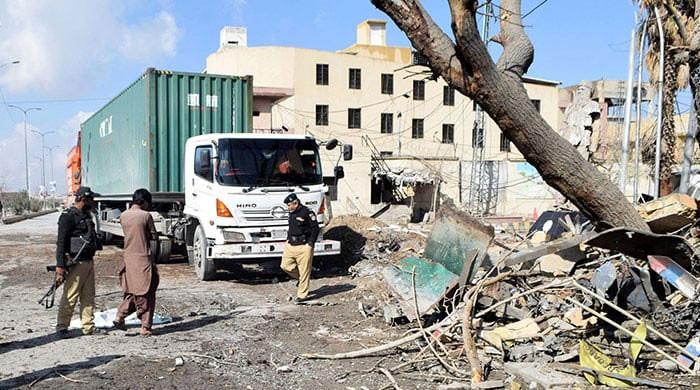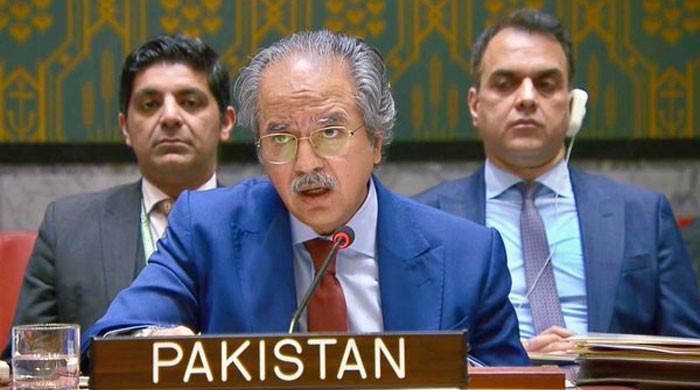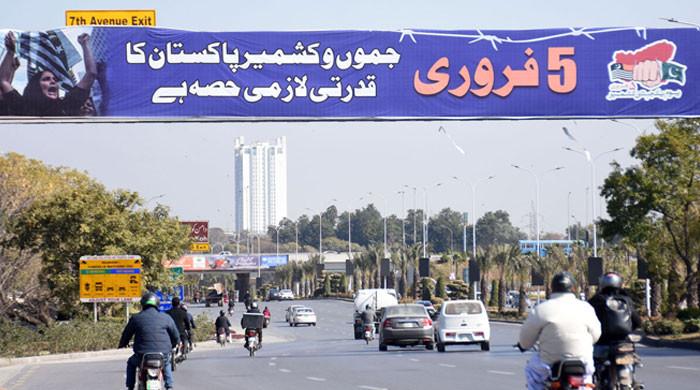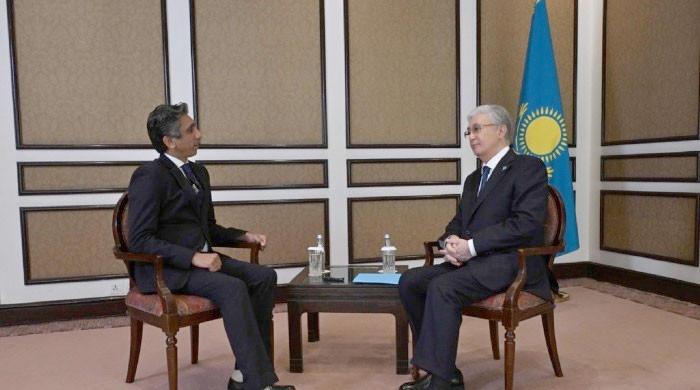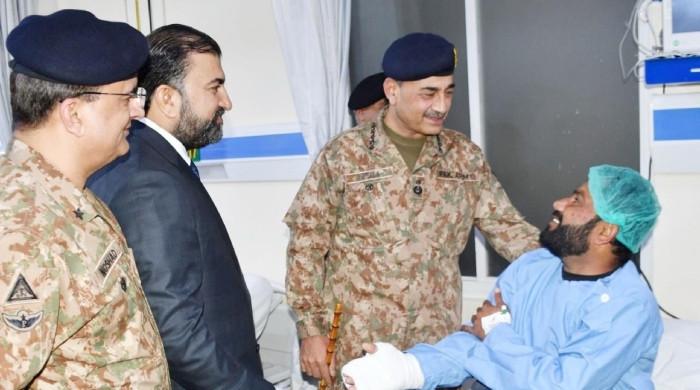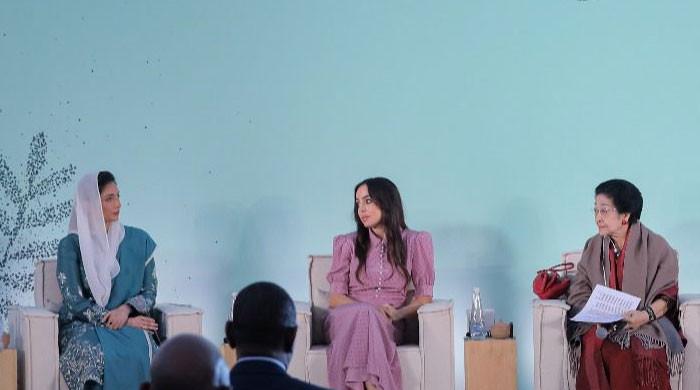Record set straight: India sought ceasefire, not Pakistan, says ISPR DG
Pakistan had brought justice and retribution for reprehensible Indian military’s aggression, says Lt Gen Chaudhry
May 12, 2025
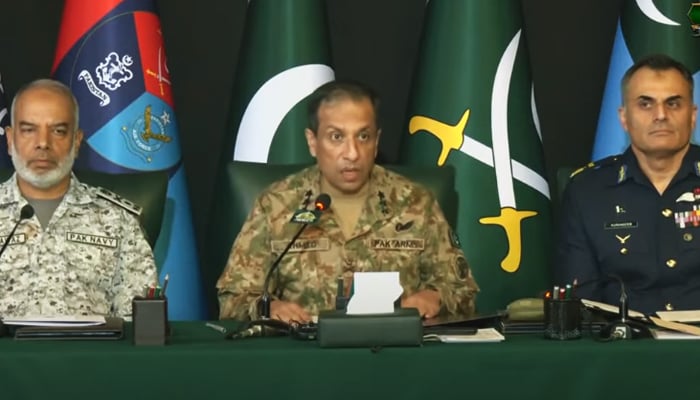
- Forces hit 26 sites in India, IIOJK used to target Pakistan: ISPR DG.
- S-400 battery system at Adhampur and Bhuj destroyed, says spox.
- Says Pakistan brought justice for the Indian military’s aggression.
RAWALPINDI: Inter-Services Public Relations Director-General (ISPR DG) Lt Gen Ahmed Sharif Chaudhry on Sunday firmly said that no one should have any doubt that whenever Pakistan’s sovereignty is threatened or its territorial integrity violated, the response will be comprehensive, retributive, and decisive.
Addressing a press conference along with the Pakistan Air Force (PAF) Air Vice Marshal Aurangzeb Ahmed and Deputy Chief of Naval Staff (Operations) Vice Admiral Raja Rab Nawaz, he said, “No one should have any doubt that whenever our sovereignty would be threatened and territorial integrity violated, the response would be comprehensive, retributive and decisive.
While sharing the details of Bunyan-um-Marsoos operation, he said, 26 military targets as well as facilities that were used to target Pakistani citizens and those enterprises that were responsible for fomenting terrorism in Pakistan were engaged in Indian illegally occupied Jammu and Kashmir and also mainland India.
The ISPR chief said that the targets included Air Force and aviation bases at Suratgarh, Sirsa, Adampur, Bhuj, Nalia, Bathinda, Barnala, Harwara, Avantipura, Srinagar, Jammu, Mamoon, Ambala, Udampur and Pathankot — all of which sustained major damages.
He added that Barhmos facilities, which had fired missiles in Pakistan and killed innocent civilians, were also destroyed.
He said that the S-400 battery system at Adhampur and Bhuj was also attacked by the proud Pakistan Air Force. Military logistics and support sites, which helped sustain this unlawful operation against innocent Pakistani civilians, like the field supply depot at Uri and the radar station at Poonch, were also targeted, he added.
He said that, military command headquarters, which helped plan the operation killing of innocent citizens, including the 10th and 80th Brigades at KG Top and Nowshera, were destroyed.
He said, facilities which harboured train and capacity proxy elements that perpetrate terrorist attacks inside Pakistan, which kill innocent civilians, were specifically identified and destroyed.
He said, across the line of control, military elements, including headquarters, logistic bases, artillery positions and posts that had caused civilian casualties in Azad, Jammu and Kashmir through unprovoked artillery and small arms fire, were relentlessly targeted and heavily damaged until they raised white flags and asked for restraint.
He said, Pakistan had brought justice and retribution for the reprehensible Indian military’s aggression and brutal killings of our citizens.
He said that during the operation, Bunyan-um-Marsoos, Pakistan’s response was a textbook demonstration of integrated tri-services jointness enabled by real-time situational awareness, network-centric warfare capabilities and seamless multi-domain operations.
“This synergy across air, land, sea and cyber domains allowed for precision engagements, overwhelming lethality and rapid tempo. All platforms operated in synergy, delivering coordinated effects at carefully selected, decisive points,” he added.
He said, using precision-guided long-range Fateh-series missiles F-1 and F-2 of the Pakistan Army, precision munitions of the Pakistan Air Force, highly capable long-range loitering killer munitions and precision long-range artillery.
The ISPR DG said that India used drones to violate Pakistani airspace to intimidate civilians and spread fear. All through Operation Bunyan-um-Marsoos dozens of Pakistani armed drones hovered over Indian major cities and sensitive political and government facilities including their capital New Delhi and from Indian Illegally Occupied Jammu and Kashmir (IIOJK) all the way up to Gujarat to manifest clearly our lethal long-range unmanned capability to indicate the futility of the use of this domain in warfare.
He said, Pakistan Armed Forces also carried out comprehensive and effective cyber offensive to temporarily cripple and degrade critical infrastructure and services that were being used by Indian Armed Forces to sustain their operations.
“Let me tell you that Pakistan Armed Forces possess an adequate suite of very sophisticated niche military technologies, all only some of which were used with restraint in this conflict and there are many more such capabilities being kept as future surprises. Despite all this let me say that compared to Indian relentless provocations Pakistan’s military response has been precise, proportionate and still remarkably restrained” he added.
He said, it was carefully calibrated to avoid civilian casualties and has exclusively targeted those entities and facilities which were directly involved in orchestrating and executing cold-blooded killings of Pakistani civilians and those carrying out terrorist attacks inside Pakistan.
The DG said, “Pakistan also sustained an abnormal and immediate spike in Indian-sponsored terrorism across Khyber Pakhtunkhwa and Balochistan while we were busy in operations on the Eastern Front.”
He said, this vindicates that India is directly involved in fomenting terrorism in Pakistan and its proxies were fully operationalised during this time to distract our attention.
Pakistan Armed Forces are resilient, and simultaneously with the conduct of Operation Bunyan-um-Marsoos, the forces carried out the most effective counter-terrorism operations in the western region without any pause.
Operation Bunyan-um-Marsoos has been a great example of coming together of all elements of national power with overwhelming support of the Pakistani public to effectively counter the threat to our national sovereignty and integrity and the threat to our great motherland.
The ISPR chief has affirmed that Pakistan never targeted civilians because “our religion, culture and professionalism” don’t allow us to do so. “We will never target civilians.”
“Even from Indian statements, did you find that Pakistan attacked anything other than military targets? No.”
He said, “Alhamdulillah, Pakistan Armed Forces have delivered the promise made to our people. I begin by thanking Almighty Allah for His infinite blessings, mercy, help and divine support as He has ordained the believers to retaliate whenever they are wronged. We bow our heads to Him in utmost humility who have enabled us to translate our resolve into decisive actions in the battlefield.”
He also expressed sympathy with the families of the shohada who sacrificed their lives for the beloved country. He prays for the quick recovery of injured countrymen.
He extended heartfelt gratitude to every officer, soldier, airman and sailor of the Armed Forces of Pakistan who made this success on the battlefield possible through their courage, professionalism and sacrifice.
He said, “The Armed Forces of Pakistan express their profound appreciation and gratitude to the brave Pakistani nation whose moral strength, resolve and above all, wholehearted support and prayers remained unwaveringly with us during these testing times, which became a force multiplier for the Armed Forces of Pakistan.
“We are specially indebted to the youth of Pakistan who became the frontline soldiers as information and cyber warriors of the country. Profound thanks are also due to you, the vibrant media of Pakistan, who also stood like Bunyan-um-Marsoos, a steel wall against the Indian media information blitz and fuming as well as warmongering done by the Indian media. We are extremely grateful to the political leadership of all political parties, without any distinction, for the unified resolve in support of their Armed Forces for the defence of our motherland.”
The military's spox said that the Armed Forces are specifically grateful to the inspiring leadership of the Prime Minister of Pakistan and his Cabinet Ministers for taking destiny changing decisions of the country and steering it through this critical situation.
Pakistan Armed Forces thank and salute the Pakistani nation for its courage, resilience and national fervour during this conflict.
Director General of the Inter-Services Public Relations (ISPR), Lieutenant General Ahmed Sharif Chaudhry, said Pakistan’s air defence system worked accurately and destroyed all hostile drones that entered its airspace.
He shared that around 84 drones were shot down. “We had promised that anything sent toward us would not go back — and we kept that promise,” he stated.
When asked about a ceasefire, the ISPR chief clarified that Pakistan never requested it.
He has “put it on record” that Pakistan “never requested for a ceasefire”. “On the night of May 6 and 7, after those dastardly and cowardly attacks were made, Indians requested and Pakistan gave a very clear response that we will communicate back only after we have given the response that this act deserves.
“So on May 10, after the response and retribution […] and on the request and intervention of international interlocutors, we responded to the already made request of the Indians,” he said.
“If you look at public statements from India’s Ministry of Defence and Armed Forces, they were clearly calling for de-escalation,” he noted.
Responding to another question, he said, “In a conflict between two rival nuclear powers … such a conflict is actually an absurdity and it is inconceivable and sheer stupidity,”.
“In the case of India and Pakistan, such a conflict can lead to peril of more than 1.6 billion people,” he said.
“In reality, there is no space for war between India and Pakistan, and if anyone wants to carve out this space for war, he is actually carving out the space for mutual annihilation.”
“This is why you saw how in this conflict Pakistan acted in a very mature manner and through conventional forces, we maintained escalation control, through conventional forces we gave them a two notch up response while also ensuring that the Pakistan forces employed on the counterterrorism operations … no pull is also exerted on them.”
The ISPR DG has clarified that Pakistan has no Indian pilot in custody, blaming it on “social media chatter”.
“This is all part of fake news and propaganda that has been generated from multiple sources,” he said.
He said Pakistan will not be cowed by the military might of its adversary. “We had assured our nation that a decisive response will be delivered — on our own terms, at a time and place of our choosing. Moreover, our retaliation will be of such significance that the world will take notice — far beyond the biased narratives of the Indian media.”
As recognised by global media outlets, he said Pakistan’s military operations strictly refrained from harming civilians, in compliance with the ethical teachings of our religion that prohibit attacks on non-combatants.
Air Vice Marshal Aurangzeb Ahmed said the Pakistan Air Force (PAF) responded boldly and confidently. “Our action was based on our own timing and choice. The leadership was clear and gave us firm instructions,” he said.
He said the PAF targeted the highest number of Indian Air Force (IAF) airfields in a single mission since 1971. “We avoided civilian damage and hit with great accuracy,” he noted.
He added that Pakistan’s swift and effective reply stopped India from creating a “new normal” through aggressive actions.
“Pakistan remains committed to protecting its airspace and promoting peace through strength,” he said.
He credited the Chief of Air Staff, Zaheer Ahmad Babar, as the main mind behind the operation. “He gave us three tasks: restore deterrence, neutralise threats, and control the air,” Aurangzeb said.
He revealed that in the first phase of the response, Pakistan targeted Indian Rafale jets, grounding the fleet near the western border. “This limited their options and freedom of action,” he said.
Aurangzeb added that India had launched drone attacks on Pakistani civilian areas. However, Pakistan’s radar and jamming systems detected and disabled all drones, making them useless.
Vice Admiral Raja Rab Nawaz, Deputy Chief of Naval Staff (Operations), said there was a lot of talk about the Indian aircraft carrier INS Vikrant coming toward Karachi. “We tracked it closely from the start. On May 6-7, it was near Bombay, and by May 9, it came within 400 nautical miles of our coast, then turned back,” he said.
He explained that if the carrier had come closer, the Pakistan Navy was ready to respond. “Our maritime air arm was fully prepared, and we stayed in contact with the Air Force throughout,” he said.
He added, “As a military officer, I don’t take the enemy lightly, but let’s be realistic. The Vikrant only carries 8-12 MiG-29s, enough for its own defence — not much more.”
He said the Indian Navy understood the heavy price they would pay if they tried to act from the sea — and that’s why they stayed back.
Rab Nawaz stated that the Pakistan Navy had maintained constant vigilance within its maritime borders and had remained prepared to respond effectively, possessing the capability to deter any enemy intrusion into its territories. He added that the Navy had ensured the ports remained operational during times of tension with India.




